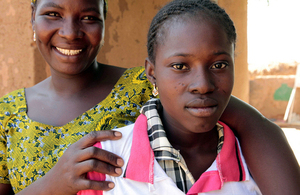Prime Minister to host event to tackle female genital mutilation and early and forced marriage for girls
Event to empower girls by ending harmful cultural practices both in the UK and overseas.

Picture: Jessica Lea/DFID
The Prime Minister will host a major event in July to tackle female genital mutilation (FGM) and early and forced marriage both domestically and internationally.
Both early and forced marriage and FGM are deep rooted cultural practices which violate the rights of girls and women both in this country and overseas.
In total early and forced marriage affects about 14 million girls every year. 1 in 3 girls in the developing world are married by age 18, and 1 in 9 are married by age 15. Some are as young as 8 years old.
Early and forced marriage is closely linked to low levels of economic development. Girls who marry young are more likely to be poor and stay poor.
FGM is an extremely damaging and excruciating painful practice which has a devastating impact on women’s and girls’ physical and mental health and well-being and their opportunities in life. Many girls die as a result of the practice and women who have undergone FGM are significantly more likely to suffer serious complications in childbirth. UN figures estimate that 3 million girls a year in Africa alone are at risk of FGM and that 125 million women and girls have been cut. In some African countries 9 out of 10 girls are cut.
The UK is already leading the way as the world’s biggest supporter of activity to end FGM. Last year DFID launched a £35 million programme that will work in 17 countries to support the Africa-led movement to end FGM.
In her keynote speech at the Transform Her Future event, International Development Secretary, Justine Greening, stated that she wanted to replicate the success that DFID and others are having on FGM with early and forced marriage.
Change is happening from communities that are deciding collectively to end these practices – to governments passing national legislation. The UK has a role to play in supporting this momentum and this summer’s event will galvanise further action to help end these practices and empower girls.